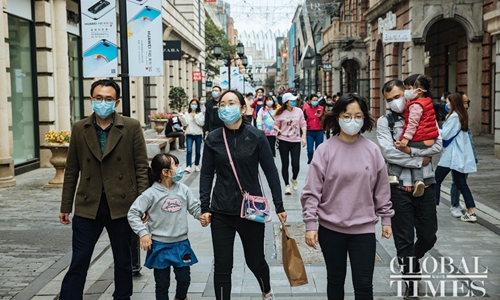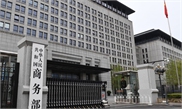SOURCE / MARKETS
Foreign firms hope China’s two sessions will help boost global economy
Government likely to hike medical sector investment

People walk to shop at the Chuhehan Street in Wuhan, Central China's Hubei Province. The city announced to disburse 500 million yuan ($71 million) worth of "consumption coupons" to residents to help restart the economy after a two-month lockdown. Photo: Li Hao/GT
Foreign business representatives have high expectations of China's upcoming two sessions as they hope to see strong government measures to support China's return to economic growth.
"China has faced significant challenges from the COVID-19 outbreak, and we expect that many of the discussions around the upcoming two sessions will be dominated by the current situation," Steven Lynch, managing director of the British Chamber of Commerce in China, told the Global Times on Monday.
The third annual session of the 13th National Committee of the Chinese People's Political Consultative Conference, the nation's top political advisory body, will start on Thursday in Beijing. The third annual session of the 13th National People's Congress, the country's top legislature, will open on Friday.
"In addition to specific policies to improve the business environment, the British Chamber waits to see whether Premier Li Keqiang will announce a new GDP growth target for 2020," Lynch said.
China has avoided a flood of stimulus measures to boost economic growth, and British businesses hope that the focus of the two sessions will be on high-quality growth and development, Lynch noted.
Last year's two sessions saw a number of announcements to improve the business climate, including the ratification of the Foreign Investment Law. British companies hope to see this same positive momentum carried forward this year, and they await the potential approval of amendments such as the draft Patent Law and Copyright Law, Lynch said.
British businesses also expect China to announce more assertive measures to boost consumption, including encouraging the development of energy-saving and environmentally friendly consumer products, the upgrading of household appliances in rural areas, more clarity on stimulus policies to increase sales and production of new-energy vehicles, and the issuance of vouchers and tax deductions to boost consumption.
Since the outbreak, 28 provincial-level regions have issued consumption coupons worth more than 19 billion yuan ($2.67 billion). The coupons, combined with livestreaming promotions, are lifting domestic consumption, Wang Bingnan, an official at the Ministry of Commerce, told a recent meeting.
The pandemic depressed Chinese people's spending power, but demand will be unleashed and "we believe that China will become the source of global consumption in the post-epidemic era," Fabrice Megarbane, president and CEO of L'Oreal China, told the Global Times on Monday.
"During this year's two sessions, we hope that China will further promote opening-up and enhance the business climate, with more effort being given to help companies bring world-class innovative products and technologies to Chinese consumers more quickly," Megarbane noted.
"Looking back on the two decades since L'Oreal expanded in China, we found that many announcements from each year's two sessions such as the 'internet plus' strategy and the Foreign Investment Law have been drivers of high-quality growth for various industries in the Chinese market. These moves have also injected strong, sustainable and inclusive development impetus into the world economy," Megarbane said.
This year's two sessions opens at a special time, coming as it does in the wake of the epidemic, and the outbreak will draw more attention to topics like public health.
"As a medical services provider, we hope the Chinese government will pay more attention to and increase investment in the medical industry because the pandemic has not only caused serious harm to public health but also had a negative impact on global economic growth," said June Chang, president of Boston Scientific China.
The Chinese government said in 2016 that public health should be given priority in the country's development strategy. It also called for a comprehensive medical system to protect people's health. "These goals and plans especially correct and urgent at the moment," Chang told the Global Times on Monday.
"We have seen the value and efficiency of technologies such as big data, internet-based medical services and artificial intelligence in public health incidents - a drive for us to upgrade the industry chain of the health care sector," Chang noted.


